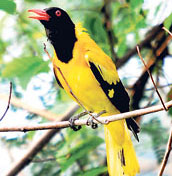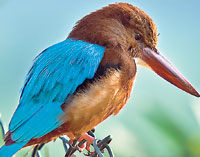I’ll never forget my first sighting of the flamingos at Bundala. Standing on their long legs, they bent their long necks clumsily to feed on the crustaceans in the brackish waters of the Bundala lagoon.
“There are flocks numbering several hundred flamingos,” said our guide mentioning that it was not a big deal to see flamingos at Bundala during the migration period at that time. This was a decade ago.
 |
 |
| Oriole |
White-throated Kingfisher |
The flamingos have flown from Bundala. The reasons were revealed by a study conducted by the Australian scientist Maria Belio.
“The crustaceans living in Bundala’s brackish water were depleted as the lagoon area is filled with fresh water released by the Kirindi Oya development project. This reduced the food availability for flamingos and the birds decided to fly away finding new grounds,” commented Maria at a forum.
It is not only important bird habitats like Bundala that are prone to environmental degradation, but every other bird habitat, including our own home gardens. The Magpie robin that used to sing every morning may be now silent – perhaps because the tall mango tree in your garden has been cut, while the crow population in your area may be on a sudden increase because of the garbage dumped carelessly. These are the early signs of the changing surroundings for birds.
One step towards being more conscious of these changes and to try to change this trend would be to keep a tab of the birds in your area. The Field Ornithology Group of Sri Lanka (FOGSL) based at the University of Colombo has declared December as bird counting month providing people an opportunity to count and record the birds around.
Just observe birds in as many places as possible – your own home garden, school premises, workplace, lakesides, paddy fields -anywhere that is frequented by birds and make a list of birds that you can identify in a given location. The list should include the date, time period of observation, location, weather at the time, the habitat that the bird was observed in, birds seen and the name and contact details of the observer.
The list can be emailed to fogsl@slt.lk or posted to FOGSL, Department of Zoology, University of Colombo, Colombo 3. Participants can also enter data directly to http://www.worldbirds.org/srilanka. |


